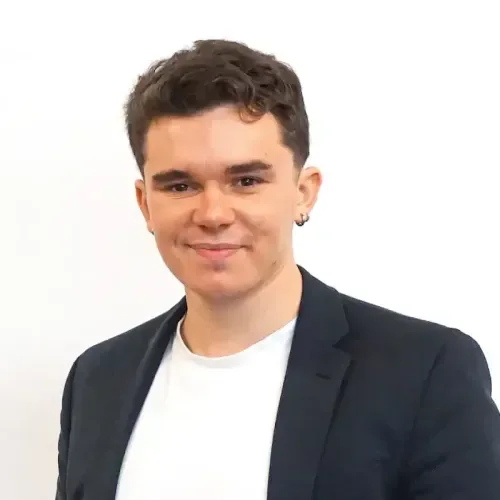Zimri t. hinshaw: engineering with intention
Soul of Silicon Valley: Listen to the episode here
Zimri T. Hinshaw, CEO of Rheom Materials
Zimri T. Hinshaw founded Rheom Materials to merge his passions for business and science, aiming to make a positive impact on the world. He’s worn many hats with experiences in lab work, business development, and investor relations, all supporting their environmental mission!
Summary written by Maya Lockwood.
When you meet Zimri T. Hinshaw, founder and CEO of Rheom Materials, you quickly understand that his company isn’t just about chemistry — it’s about impact. Rheom engineers bio-based, ethical materials designed to prove that elegance, performance, and environmental responsibility can coexist. But behind the innovation lies something deeper: a belief that the future of industry must be aligned with human and planetary well-being.
I chatted with Zimri for The Soul of Silicon Valley series to explore the personal journey, intention, and creative philosophy shaping Rheom’s rise from a dorm room experiment to a scaling materials company redefining what “sustainable” really means.
a New Material
Rheom’s story began far from Silicon Valley — in Okinawa, Japan, where a young Zimri attended high school and became fascinated with the sharp, minimalist design of local motorcycle jackets. When he later moved to Philadelphia for college at Temple University, he wanted to create his own version — but as a lifelong vegetarian, he couldn’t accept leather’s environmental and ethical cost.
So he started growing his own.
Literally.
“I saw people on YouTube experimenting with kombucha as a biomaterial,” Zimri recalled. “I started growing kombucha under my dorm bed. My roommate was not happy — it’s a very smelly process!”
That small act of curiosity set the foundation for Rheom. But Zimri quickly realized that inspiration alone wasn’t enough; scaling technology requires pragmatism. “You can’t be too married to a single method,” he explained. “The real question is: what does the market want, and how do we deliver it sustainably?”
Today, Rheom has evolved from kombucha leather experiments into a full-fledged materials science company using melt extrusion technology, enabling them to integrate directly into existing plastics infrastructure — without needing to build new factories.
Engineering with Intention
Zimri’s philosophy of leadership challenges a core assumption of modern industry: that technical excellence and moral purpose are separate pursuits.
“In any field — even oil and gas — you’ll find people who genuinely want to make environmental change,” he said. “The problem isn’t the people. It’s that they don’t have vehicles to use their skills for good.”
By establishing Rheom in Houston, Zimri found a surprising ally in the very heart of the petrochemical world. Scientists and engineers from legacy materials industries were eager to join him — including Rheom’s Chief Science Officer, Dr. Alex Kalin, and Chief Technical Officer, Dr. Carolina Amin Ferril.
“You don’t have to infuse a moral intention,” Zimri reflected. “It already exists. You just need to provide a vehicle for it.”
Rheom is now entering a phase of scaling — with investors, partners, and commercial traction. The challenge: how to stay true to the ideals born in a dorm room while facing the pragmatic realities of manufacturing and growth.
“You have to accept incremental progress,” Zimri said. “Our goal is 100% bio-based materials, but the first market-ready version might be 93%. That doesn’t mean you’ve lost your North Star. It means you’re walking toward it step by step.”
With early products like Shorai, a bio-based leather alternative, and Benree, a 100% bio-based hard resin for injection molding, Rheom is already proving that sustainability can meet — and even exceed — performance standards. The company has also begun developing biofibers, extending its vision into a broader materials ecosystem.
“Commercial traction gives you resources to dedicate back to your mission,” Zimri said. “The North Star isn’t compromised — it’s empowered.”
While many founders in climate tech speak about systems and sustainability, Zimri often speaks of emotion, accessibility, and elegance.
“It doesn’t matter if the science is great if no one’s excited about it,” he said. “You have to make it real — something people can touch, wear, and love.”
That ethos inspired Rheom’s creative campaign at the Houston Rodeo, where the company debuted their bio-based materials through jackets, skirts, handbags, and belts worn by models two-stepping and laughing under neon lights.
“If it fits in at the Houston Rodeo,” Zimri smiled, “it fits anywhere.”
The message is simple yet profound: you don’t have to change who you are to live sustainably. “We meet people where they are,” Zimri said. “You can eat meat or be vegan — it doesn’t matter. Our materials are for everyone.”
When asked what he hopes people will say about Rheom years from now, Zimri’s response was both visionary and grounded:
“I hope people say this was the turning point — where people began to feel good about what they wear and the impact they have. That we made the air cleaner, the water less toxic, and the world more joyful.”
Ultimately, Rheom’s legacy, he hopes, will not only be cleaner materials — but happier humans.
Leading with Kindness and Clarity
In an industry often fueled by pressure and competition, Zimri stands out for his calm, values-driven approach to leadership. His advice to other founders is disarmingly simple:
“Know who you are. Truly understand your values. Be calm. Be Honest. Stay kind. When your actions align with your values, there’s no stress — even if you make mistakes. You’re doing the best you can for the right reasons, and that’s liberating.”
Zimri remind us that the most powerful technologies are born not just of intellect, but of integrity — of knowing who you are, and choosing to build something beautiful from it.
Rheom Materials is raising a round of funding to accelerate its mission. Learn more at rheommaterials.com.
